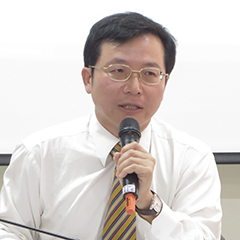- Member
- Research Summary
- Research output
Over past 20 years, although Taiwan government, with the requirements of International Green Convention, and gradually adjusts sustainable economic and industrial policy, in real industry expansion is continuous development and planning of high energy consumption and high carbon biochemical industry, and at different stages Triggering major social struggles. And even in facing of international carbon reduction and domestic environmental movement double pressure, but still cannot stop emerging industrialized countries often to expand energy-intensive industries, in particular, can be made into a variety of people's livelihood petrochemical industry as the main means of rapid economic expansion. Year-round comparison of petrochemical industry, energy-intensive industries, industrial sector energy consumption, carbon dioxide emissions, energy intensity and GDP contribution, we can see, nearly 10 years of petrochemical industry, energy consumption and emissions accounted for the proportion of country increased, and drove country's growth; however, the proportion of its contribution to GDP has not increased, but has been maintained at a low flat level. In other words, it shows that most of the petrochemical industry has remained in the low-value-added products of energy consumption for more than a decade and has not been actively transitioned. Taiwan, which is highly dependent on long-term energy, has the problem of structural change of Taiwan's industrial transformation, in addition to the systematic cause of high energy consumption and high-emission carbon in the country, which has not changed for a long time.
Taiwan due to lack of natural resources, in 20 years, nearly 98% of energy were from foreign imports, imports of energy dependence is quite high, 97.53% (2015), 97.75% (2014), 97.58% (2013), 97.49% (2012), 97.68% (2011), and the number of imported energy increased steadily with the growth of economy. In recent years, the number of imported energy is 144,554 kiloliters of oil equivalent (1000KLOE) (2014), 140,129 kiloliters of oil equivalent (1000KLOE) (2013), 137,695 kiloliters of oil equivalent (1000KLOE) (2012). Corresponding to high degree of dependence on energy imports, energy consumption in structure, since 1990, nearly 20 years, Taiwan's energy consumption increased steadily, and since 1995 in addition to transport sector, service sector and housing sector increased stably slightly higher, mainly in the energy consumption of the substantial growth of industrial sector; industrial sector energy consumption in year 2000 exceeded 45%, accounting for nearly 50% in 2005, accounting for 52.5% in 2009, accounting for up to 53.61% in 2010. These trends show that Taiwan's energy consumption has increased significantly with the growth of industrial sector, which is the main reason for energy consumption and carbon dioxide emissions growth. And did not follow important climate change carbon reduction policy and industrial restructuring plan, go for clear turn, but run reversely.
In addition, in recent years, Taiwan's air pollution issues have been constantly fermented and warming, causing social and civic groups of broad attention and public opinion. However, the problem of air pollution is not only related to the conflict between environmental protection and economic development, but also to the health risks of our people, and will further lead to the risk distribution of environmental injustice under national governance. It can be found that the air pollution of human society, in fact, presents a typical risk of social characteristics, because "air and people" have close relationship, the most direct impact is physical life problem. Therefore, environmental pollution control subject of air pollution, in fact, the dangerous test of government's risk management model, if take traditional thinking to deal with environmental policy, delivery single type of administrative organs of air pollution control policies, it may make government suffer from people’s distrust and protest conflict. Therefore, the issues need to be coordinated across different government departments and cross-domain governance in order to solve environmental problems under air pollution, health hazards and environmental education and other issues.
In this regard, the project that Taiwan's industrial and energy transformation issues should be discussed with air pollution control issues, and conduct in-depth study. To follow risk society, regulatory science theory and other macro-perspective and ways, by literature review method to study advanced countries and organizations how to deal with air pollution control; also by experts, focus groups and other research methods for more in-depth and clarify the status of our air pollution control policy, standardize the standards and dilemma problems. Such as how to solve our central and southern regions industries, manufacturing counties and cities air pollution emissions affect industrial and manufacturing industry and county pollution? At present, allocation of air control area can effectively carry out pollution control responsibility? The implementation of total air pollution control conditions, the plight of control policy and lack of legal system? How does government effectively carry out the risk communication on air pollution? The purpose of this study is to explore Taiwan's past economic-driven development model, bringing high energy consumption, high carbon structure, confronting the confrontation between low carbon sustainability and air quality requirements, and the development of environmental and health dilemma governance transformation needs.
| 學術產出 | |
| 期刊 | 趙家緯、周桂田,2017,能源轉型下的電價新思考,經濟前瞻 172 期,28~33 頁。 |
| 研討會 | 趙家緯,2017,前瞻政策環評啟動水泥與礦業轉型,國土原環上的礦業-礦業法修法與展望研討會,7 月 1 日。 |
| 專書 | 周桂田(2016)。〈氣候變遷驅動下臺灣能源轉型挑戰〉,收錄於周桂田、林子倫主編之《臺灣能源轉型十四講》,頁3-26。 |
| 專書 | 高淑芬(2016)。〈能源轉型的在地實踐:社區型能源與公民電廠〉,收錄於周桂田、林子倫主編之《臺灣能源轉型十四講》,頁181-197。 |
| 專書 | Kuei-Tien Chou.(2017). 〈Tri-helix energy transition in Taiwan.〉 Energy Transition in East Asia: A Social Science Perspective. page: 45-73. Routledge. |
| 專書 | Shu-Fen Kao & Ying-Feng Chen (2017). 〈Energy Democratization in Taiwan: Current Problems and the Civil Society’s Advocacy .〉 Energy Transition in East Asia: A Social Science Perspective. page: 104-124. Routledge. |
| 專書 | 周桂田(2017)。〈第三章 臺灣永續發展的困局〉、〈第四章 高碳社會結構〉收錄於周桂田之《氣候變遷社會學》,頁41-88。 |
| 專書 | 趙家緯(2017)。〈能源外部成本的治理挑戰與出路〉,收錄於周桂田、張國暉主編之《【能】怎麼轉:啟動臺灣能源轉型鑰匙》,頁245-268。 |
| 專書 | 陳潁峰(2017)。〈能源轉型的新契機:地方性能源倡議〉,收錄於周桂田、張國暉主編之《【能】怎麼轉:啟動臺灣能源轉型鑰匙》,頁83-101。 |
| 專書 | 高淑芬(2017)。〈地方能源轉型的社會學習與公民參與〉,收錄於周桂田、張國暉主編之《【能】怎麼轉:啟動臺灣能源轉型鑰匙》,頁103-118。 |
| 專書 | 林子倫、趙家緯、龍吟欣(2018)。 〈全球化石燃料補貼改革發展趨勢分析〉,收錄於周桂田、張國暉主編之《轉給你看:開啟臺灣能源轉型》,頁71-92。 |
| 專書 | 鍾明光、王翊芬(2018)。 〈政府資料開放政策下的電力資訊與解析〉,,收錄於周桂田、張國暉主編之《轉給你看:開啟臺灣能源轉型》。頁143-168。 |
| 專書 | 趙家緯(2018)。 〈邁向 轉型時代-破除「以煤易核」、「犧牲生態」與「成本昂貴」的三重迷思〉,,收錄於周桂田、張國暉主編之《轉給你看:開啟臺灣能源轉型》。頁93-112。 |
| 專書 | 陳潁峰(2018)。 〈社區能源的正義課題〉,,收錄於周桂田、張國暉主編之《轉給你看:開啟臺灣能源轉型》。頁187-202。 |
| 媒體投書與專題報導 | |
| 自由時報 (周桂田) |
《星期專訪》周桂田教授︰石化業應轉型 立專法、專區管理 |
| 中國時報 (中心能源資訊組) |
竹桃苗 全台用電王;電價漲是必然 專家籲徵碳稅 |
| 自由時報 (周桂田) |
氣候變遷行動綱領需要公民參與 |
| 自由時報 (周桂田) |
星期專訪─台大國發所所長周桂田︰能源轉型缺乏明確路徑圖 |
| 蘋果日報 (周桂田、杜文苓、林木興) |
台化事件浮現能源轉型與產業升級契機 |
| 蘋果日報 (周桂田) |
巴黎氣候協定4日生效 台大風險中心提四問題 |
| 中時電子報 (風險中心) |
巴黎協定生效 台大提4建議籲政府加速減碳 |
| 中央社 (周桂田) |
電價該漲就漲 學者:產業也要轉型 |
| 聯合影音網 (中心能源資訊組) |
弱勢家庭難負擔 關懷能源貧窮族群 |
| 公視 (風險中心) |
我們的島【能源台灣】能源台灣 -便宜的代價 (I )、 (II) |
| 公視 (風險中心) |
我們的島【能源台灣】能源台灣 -啟動轉型之路 (I) 、 (II) |
|
風傳媒 (趟家緯) |
核電就能減碳?臺大風險中心計算馬政府核四商轉 碳排放仍高過非核家園 |
| 環資中心 (風險中心) |
離島油價和路燈電價 APEC角度看化石燃料補貼 |
| 環資中心 (風險中心) |
為何311後繼續擁抱核電? 台日韓學者談能源轉型障礙與未來 |
| 低碳生活部落格/IC之音 (趙家緯、林怡均) |
氣候戰役在臺灣-缺電之夏系列一: 談缺電前先搞清楚,台灣的電都用到哪去了? |
| 低碳生活部落格/IC之音 (趙家緯、林怡均) |
氣候戰役在臺灣-迎戰「缺電」之前,先搞懂2017年用電狀況 |
| 低碳生活部落格/IC之音 (張國暉、林木興) |
能源轉型屢卡關?台大風險中心《轉給你看》! |
| 氣象達人彭啟明臉書專頁 (周桂田) |
轉給你看—開啟臺灣能源轉型 |
| 研究報告 | |
| 報告類型 | 篇名 |
| 富邦報告 | 2016年專案年度報告-產業與能源之排碳與污染治理、基礎能源轉型資料庫建置 |
| 富邦報告 | 2017年研究計畫案期末報告-產業與能源之排碳與污染治理、基礎能源轉型資料庫建置 |
| 其他產出 | |
| 類型 | 標題 / 活動名稱 |
| 翻譯報告 | 梵蒂岡宗座科學院宣言:我們的地球,我們的健康以及我們的責任 |
| 電子報 | Open Energy_2016臺灣用電地圖 |
| 電子報 | Open Energy_臺灣能源情勢國際排名 |
| 電子報 | Open Energy_台灣十大溫室氣體排放企業之排放量變化暨退休金高碳投資分析 |
| 電子報 | Open Energy_2013年-2015年台灣耗能產業十大溫室氣體排放源之排放量趨勢分析 |
| 電子報 | Open Energy_2017臺灣用電地圖 |
| 電子報 | Open Energy_2017臺灣能源情勢回顧 |
| 電子報 | Open Energy_台灣十大溫室氣體排放企業之排放量變化與轉型行動簡析 |
| 電子報 | 解讀臺灣2016能源情勢 |
| 電子報 | 市民就是能源─臺灣地方能源治理的回顧與展望 |
| 電子報 | 靠近市民的一小步,是地方能源治理的一大步 |
| 電子報 | 耗能產業低碳轉型策略-以石化業與鋼鐵業為例 |
| 活動紀實 (富邦全球化講堂) |
臺大與富邦簽約記者會暨富邦全球化講堂第一講 |
| 活動紀實(論壇) | 2016臺灣風險社會論壇——不能等了!能源貧窮迫在眉睫 |
| 活動紀實(論壇) | 東亞能源轉型論壇:臺日韓能源轉型的挑戰與展望 |
| 活動紀實(沙龍) | 2018鉅變新視界沙龍─鉅變新觀點「在奇蹟之後:台灣產業發展的必然與偶然」 |



